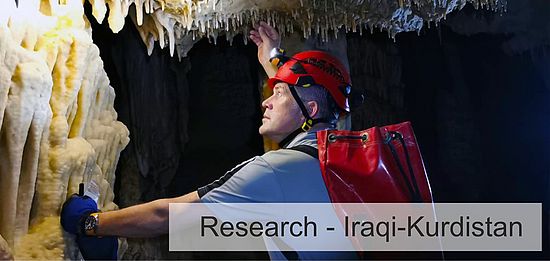
Summary
SW-Asia (Eastern Turkey, Iraq and Iran) is a key region for paleoclimate and paleoenvironmental research for several reasons. Firstly, the region is a hotspot to climate change, where water availability is a key-parameter for societal stability. Secondly, regional climate conditions are influenced by two major climate systems, the North Atlantic/Siberian pressure system in winter and the Indian monsoon in summer. To date the interaction between these systems remains uncertain, warranting further investigations. Thirdly, SW-Asia is a key-area where two of the most fundamental transformations in human history took place; the rise of agriculture and emergence of advanced complex societies and development of the first cities, states and empires in recorded history. It is very likely that climatic and environmental changes were important factors contributing to these socio-cultural transformations and the rise and fall of empires. However, our understanding of the causes and patterns of climatic and environmental changes and their influences on societies in SW-Asia remained very limited. This is due to the brevity of instrumental records and scarcity of precisely-dated and highly resolved climatic and environmental reconstructions. Therefore, our research aims at using speleothems from various caves in Iraqi-Kurdistan to develop a network of precisely-dated multi-proxy climatic and environmental records. These records will form a confluence of numerous physical, chemical and biological parameters to reconstruct a wide range of climatic and environmental variables, reducing the uncertainties associated with the interpretation of single parameter studies. Moreover, a dense network of paleorecords is required to address the great spatial heterogeneity of climate in SW-Asia; connecting the gap between the more widely studied European, Eastern Mediterranean and Central Asian regions.
Key Publications
Fleitmann, D., Bosomworth, M.; Amin Al-Manmi, D.A.M.; Leng, M.J., Sahy, D., Radner, K., Morgan, A., Pike, A.W.G., Altaweel, M., 2025. Mid-Holocene hydroclimatic optimum recorded in a stalagmite from Shalaii Cave, Northern Iraq. Quaternary Science Reviews, 356. https://doi.org/10.1016/j.quascirev.2025.109286
Flohr, P., Matthews, R., Matthews, W., Richardson, A., Fleitmann, D. (2021). Radiocarbon dates from Sheikh-e Abad, Iraqi-Kurdistan. In: Central Zagros Archaeological Project (CZAP) Volume 2: Sedentism and Resource Management in the Neolithic of the Central Zagros. Eds. R. Matthews and W. Matthews, Oxbow Books.
Bosomworth, M., Fleitmann, D., Rabbani, M. (2020). Palaeoclimate and Environment of the Iraqi Central Zagros. In: The Early Neolithic of the Eastern Fertile Crescent: Excavations at Bestansur and Shimshara, Iraqi Kurdistan, Eds. Matthews, R., Matthews, W., Raheem, K.R., Richardson, A., Oxbow Books, pp. 688.
Altaweel, M., Marsh, A., Jotheri, J., Hritz, C., Fleitmann, D., Rost, S., Lintner, S.F., McGuire, G., Bosomworth, M., Jacobson, M., Garzanti, E., Limonta, M., Radeff, G. (2019). New insights on the role of environmental Dynamics shaping Southern Mesopotamia: From the Pre-Ubaid to the early Islamic period. Iraq, doi: 10.1017/irq.2019.2.
Marsh, A., Fleitmann, D., Al-Manmi, D.A.M., Altaweel, M., Wengrow, D., Carter, R. (2018). Mid- to late-Holocene archaeology, environment and climate in the northeast Kurdistan region of Iraq. Holocene, doi.org/10.1177/0959683617752843.
Flohr, P., Fleitmann, D., Zorita, E., Sadekov, A., Cheng, H., Bosomworth, M., Edwards, L., Matthews, W., Matthews, R. (2017). Late Holocene droughts in the Fertile Crescent recorded in a speleothem from northern Iraq. Geophysical Research Letters, 44, doi: 10.1002/2016GL071786.
Facts & Figures
Funded by
SNSF Sinergia Project "Holocene hydroclimate, drought dynamics and environmental change recorded in multiple archives from SW Asia (MITRA) (visit https://data.snf.ch/grants/grant/10000157 for further details).
Duration 2024-2028
Arts and Humanities Research Council (AHRC) SWW DTP PhD-studentship to Matthew Bosomworth
Duration 2017-2021
Responsible Scientists
Prof. Dominik Fleitmann
Dr. Stéphane Affolter, Dr. Alice Paine, Alistair Morgan, Peyman Parvizi, Yugandhar Nighojkar
Quick Links
Social Media
